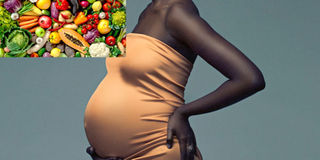Covid-19: What a pregnant woman should eat

Even if a mother can not get much, they should try to get the main sources of major nutrients.
What you need to know:
The coronavirus pandemic has caused food shortage and a number of pregnant women have had to go without food or reduce the meals they eat per day. Here is what they can eat to maximise on nutrients.
A healthy mother gives birth to a healthy child and this is only possible if she feeds well. If the mother does not get sufficient food, she is likely to develop ulcers but most importantly, when this is prolonged, the mother will become anaemic, give birth to a low birth weight baby and a premature birth.
There are circumstances, however, when there is scarcity and it is not possible for the mother to eat the recommended minimum of three meals a day.
According to Betty Nagawa, a nurse-midwife at Mildmay, a pregnant mother should eat on time or the mother will be weak, the baby will not get a sufficient supply of blood and there will be an interruption in the work of the placenta, which will generally affect the baby.
She, therefore, recommends that there are essential foods that pregnant mothers can eat in the times of scarcity that can help sustain both mother and child.
Proteins
The protein you eat during pregnancy is essential for the growth of the baby, making antibodies for its immune system as well as repairing the mother’s damaged tissues and body cells. This, therefore, makes proteins one of the most important nutrients in the body.
Nagawa reccomends milk because it is rich in calcium, protein and many other nutrients.
“Even though it is in small amounts, especially if it is dilute, milk contains a balanced diet that is essential during pregnancy. When the mother consumes food, the foetus benefits first then the excess of the nutrients are stored by the mother’s body,” she says.
Dried beans are also essential in the provision of proteins, iron and folate. These help increase blood supply in the mother’s body and for the growing embryo.
Incorporating beans also helps supply fibre that can help to ward off constipation. Other protein-rich foods that would be good for an expectant mother include eggs, fish and meat.
Carbohydrates
The main source of energy in the diet of an expecting mother is a carbohydrate. When broken down, these are converted into glucose, a simple sugar that can easily penetrate the placenta to provide energy that supports the growing foetus.
Different foods have different levels of starch and energy but foods such as posho, sweet potatoes, yams, cassava contain high levels of the starch that is able to sustain an expectant mother for quite some time.
“If a mother can access any of these foods in this time of scarcity, Nagawa says, it can sustain her and the growing baby because it satisfies sugar cravings and can make her full for some time compared to the lesser starchy foods.”
Fruits and vegetables
The body needs vitamins D and C to help in the absorption of some minerals as calcium and iron respectively. Such vitamins can be obtained from fruits and vegetables. These also contain other nutrients other than vitamins such as folate and fibre.
Bananas, for instance, contain fibre and calcium that regulates bowel movement and helps in the skeletal development for the foetus. “An an expectant mother needs a roughage (vegetable) for a proper bowel movement, for the vitamins and minerals.
Nagawa also remarks that even when the mother is not able to eat all these foods at the same, they would still be beneficial if she ate one class of food at a time. It is not recommended to eat one type of food all the time because it can lead to an excess of a particular nutrient while compromising other nutrients.
Important nutrients
Folic acid: Found in beans, citrus fruits, green leafy vegetables and your prenatal vitamin.
Calcium: Found in dairy (milk, yogurt and cheese) and dark leafy greens.
Iron: Found in meat, poultry, seafood, beans and greens.
Choline: Found in red meat and eggs.
Vitamin B12: Found in meat, poultry, seafood, as well as fortified breads and cereals.
Omega-3 fatty acids: Found in fatty fish, chia seeds, flax seeds and fortifed foods.
[email protected]




